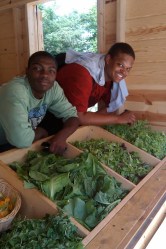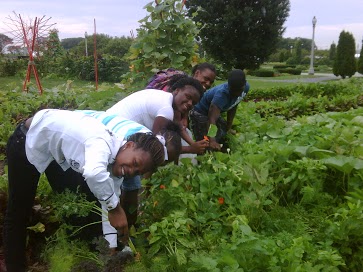
Growing Power
A new, seven-acre urban “accelerator farm” taking root on Chicago’s south side will soon grow one of the Windy City’s most-needed crops: farmers.
Called South Chicago Farm, it will be the seeding ground for Farmers for Chicago, a recruiting program announced today by Mayor Rahm Emanuel and Growing Power, the Milwaukee-based urban farming organization founded by MacArthur Award-winning urban ag luminary Will Allen. The three-year, tuition-based farm becomes part of the city’s new “incubator network” through which the city is making land available for farmer training. Emanuel, who unveils the network plan today, says getting farmers on the land is the next big step toward building a strong, local agriculture system.
The farm site, located across the street from a former steel plant, includes walking trails and an adjacent plot that will hold community gardens for 100 local families overseen by Growing Power.
Erika Allen, Chicago and national projects director for Growing Power (and Will Allen’s daughter), says that while the city is making huge advances in developing urban agriculture, there simply aren’t enough farmers to grow the food that Chicago needs. Detroit, Cleveland, New York, and other cities that are working to build local food systems are also feeling the farmer drought.
Growing Power has been a leader in the urban ag movement nationally and operates eight farms throughout Chicago. Erika Allen says six to 12 farmers will be chosen for the program, with farming beginning on small parcels as early as May. When in full operation, Farmers for Chicago will school 100 farmers annually.
To start, Farmers for Chicago will only take applicants with prior farmer training who submit a business plan. The program will help these emerging growers launch their own businesses by providing not just the land, but also technical assistance, shared tools, seeds, and access to local markets. Allen says the program provides participants with three years of support, earned income, and rights to lease and farm the land long-term.
Tuition will go toward operating and lease costs. Allen estimates tuition will be $200 a month during the first year, then dropping as farmers advance in the program. Scholarship funds will eventually be available for economically challenged students. Produce grown at the site will help bring fresh food to local neighborhoods as well as small, local retailers moving into the healthy food arena.
Training and incubator farms will further advance Chicago’s goals for urban agriculture by not only creating a local food supply, but teaching marketable job skills including hoop house construction, food processing, compost production, and both retail and wholesale sales. Via the incubator network, farmers will be able to graduate to city-owned land, helping to make use of hundreds of vacant lots created by disinvestment and economic blight.
The city owns 15,000 vacant lots. However, it takes the work of one farmer to care for a quarter-acre of land. And it costs the city $250,000 to get a half-acre of city land prepared to farm. The cost includes new soil, compost, fencing, and adding a water supply.
The training and incubator network will be made up of more than 15 acres of land throughout the city, including the new South Chicago farm and established urban farms run by Angelic Organics, Growing Home, Heartland Human Care Services, the Washington Park Consortium, and the Chicago Botanic Garden. Several more will be added next year. Heartland is currently developing the 2.6-acre Chicago FarmWorks in Garfield Park, a work-training farm creating jobs in urban agriculture. The Chicago Botanic Garden, through its Windy City Harvest system, is preparing the new 1.7-acre Legends Farm, also an incubator, in the city’s Grand Boulevard/Grand Crossing neighborhood.
The network further deepens the city’s commitment to urban agriculture and providing healthy food for residents. In 2011, a new urban agriculture ordinance went on the books, and late last year, Emaneul announced the formation of an urban farm district on the city’s south side. Last month he set an agenda to get Chicagoans eat healthier.
Peter Strazzabosco, deputy commissioner for the Chicago Department of Housing and Economic Development, says no other city in the country is working so hard to provide city-owned lots for farming use. Last November, the city announced the formation of a large, South Side urban ag district, making it one of the most comprehensive plans in the country.
The mayor’s support for farming in Chicago is creating not only awareness among residents about healthy eating and possible new job growth areas, it is also garnering national attention. What sets Chicago apart, says Dave Snyder, program manager at Chicago FarmWorks, is the will behind its urban ag movement.
“It has cultural support from the mayor all the way down to tiny little block clubs,” Snyder says. “But what people don’t realize is that Chicago has a long, long history of both gardens and farms within the city. We had the Slum Busters (south side neighbors who planted gardens as a way to beautify their communities) of the ’80s and ’90s who were doing this thing before anyone even thought of it. And it underpins the culture we have today.”
Of Chicago’s evolution into urban farming, Snyder says the transformation is casting the city in a different light.
“To be certain, Chicago is going to be a very large urban ag hub. I can’t think of another place where city government is turning over land for farming,” Snyder says. “The commitment is real and it’s a thriving and diverse scene. Chicago has this reputation of being segregated. Yet, last week I went to a community garden summit and when I walked in there was the most diverse group of people you could ever imagine.”



